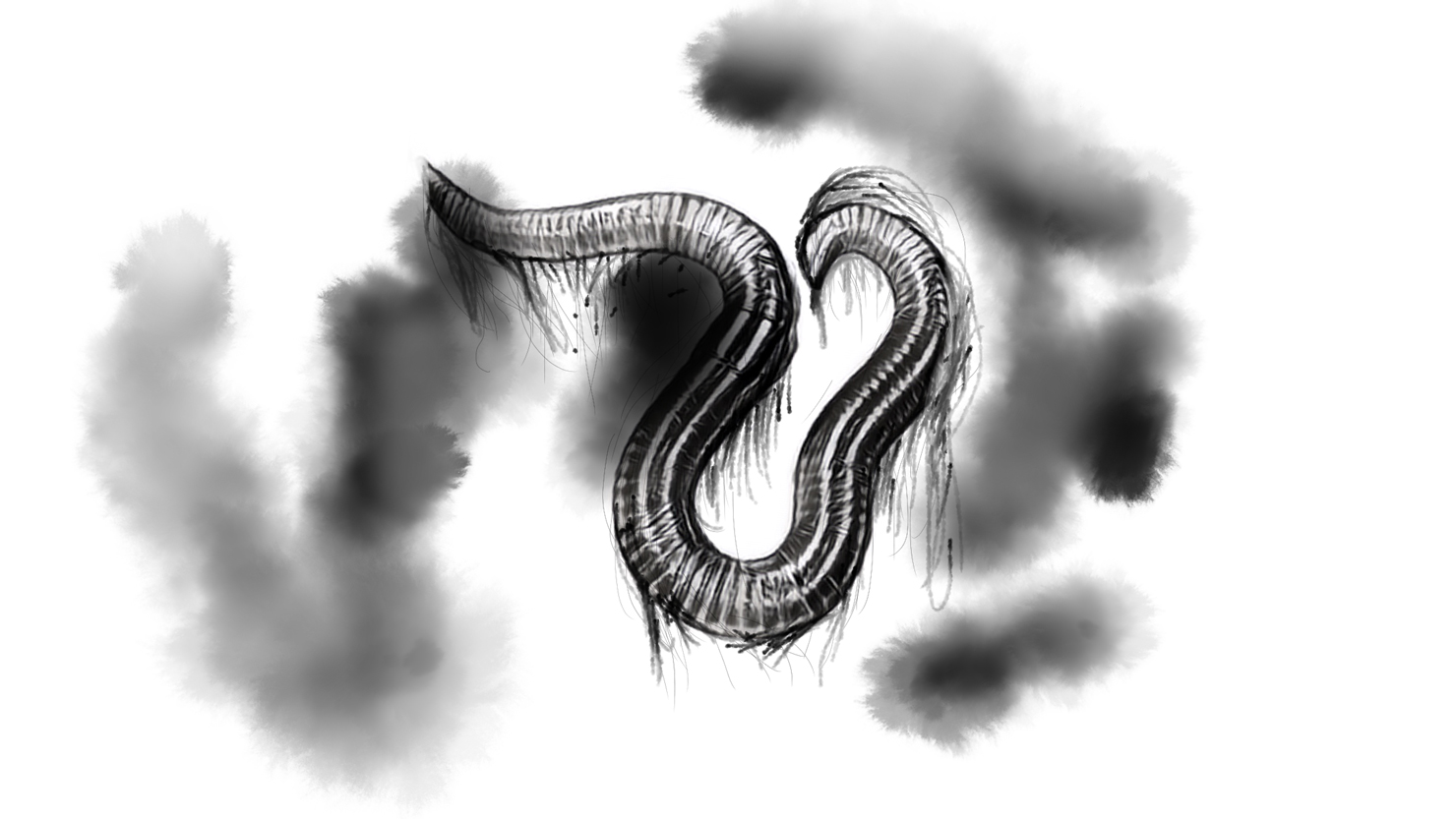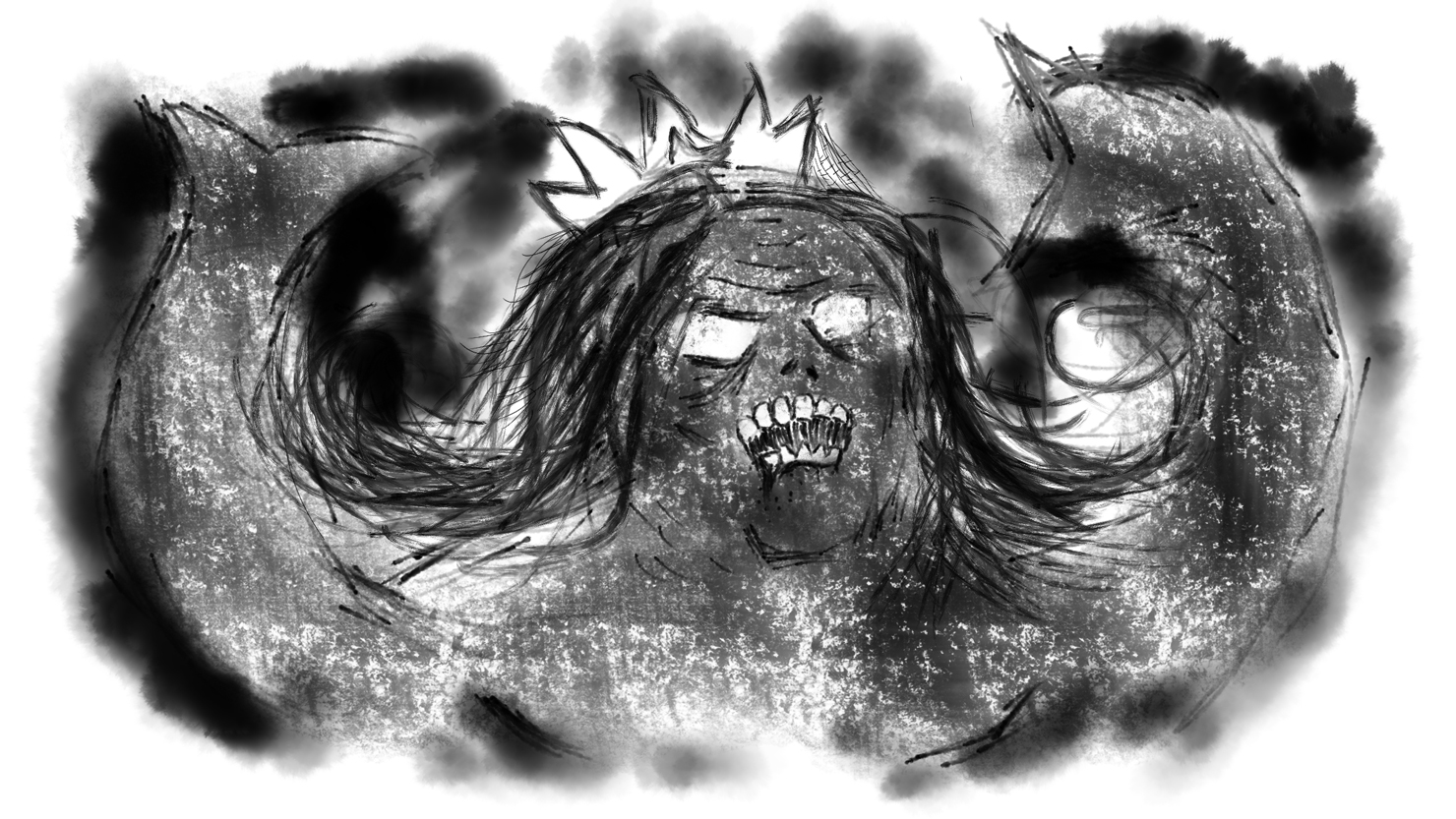
The houses on our street were built all at once after the war. My parents were children in them when they were new, but by the time I grew up the houses were already broken and weedy, and the siding engineered by the war scientists had been warped by the sun.
It was the first week of warmth after the winter. It was the year I was fifteen, my first year of service. I was still unused to work and it showed in my dirty uniform, my dirty hair, and the sores around my mouth. My grandmother was always telling me to try to remember to eat an orange once in a while, but it was hard to remember when there was little in the pantry to remind me.
Early in the morning, I made for the freeway and the shop once I crossed it. Trudging down our row of single family dwellings, most of them like mine with a grandmother in the basement, I felt immense sympathy for creatures displaced from their natural environments, especially for the pink and purple worm I saw gasping on the sidewalk. My grandmother said worms were great helpers and I thought perhaps it was time someone did them a good turn. The worm coiled around my finger like a ring of muscle, all friendly. I should have transplanted him to a lawn. It would have been kinder. But I took him to the goddess’s shop.
Although I wanted to parade through the heavy steel door with my prize, I was obliged to cover my left finger with my right hand because Siren might have seen me. The people might have cried out. The other aprons and I milled around, gathering our hair into nets and removing the rings from our noses. We all lined up for the clock. I slipped the worm into my green pocket, so Siren wouldn’t guess I’d brought a fellow foreigner to work, I was sullen as usual.
Every day she pushed me up in front of the slavering crowd and made me perform. That day, I hoped, the worm would somehow help me. Jostling, balancing on spiked shoes, silk nooses around their necks, the people would ask me to do a series of impossible tasks. I was to heat water past the boiling point, mirror the molecular structure of sugar, cure the common allergy to fat, and cause ice cubes to float in hot tea. I was to make coffee that tasted unlike itself and transform a cup of milk into a celebration feast. I was also to smile at insults, do nine tasks at one time, make certain members of the mob disappear when others called for it. There was no time to think, rest, or even urinate. I forgot all about the worm in my apron pocket.
When I remembered my helper, I was struggling to create a blizzard in a vessel. I scrabbled in my pocket, trying not to pinch the worm and sever him. Chunks of ice rattled and my spinning knives screamed, but I paid no notice. The worm lay limp and hot in my palm like a snapped elastic band. In a panic, I started stroking him. He was drying out quickly. I could feel his segments feebly contract. As my blizzard started to liquify, the people’s murmurs grew, and as I lifted my hand to the crusted, dripping faucet with the worm lying abject on my palm, the murmurs grew into an uproar. The noise of the people roared in my ears.
An apron with a collapsed chin and faded pink hair shot me a desperate glance. Her eyes looked like the eyes of the raccoons that roamed our street in a pack at dusk to protect themselves from the stones and hockey sticks of the little kids.
I looked around. The mob was threatening to break down the money counter that separated them from us. I backed up. My hip hit a machine and I couldn’t move any farther. I gently dropped my friend into a basket of boiling hot coffee grounds above one of the big urns. He reared up in solidarity, what must have been his eye-end, his mouth-end, weaving back and forth in the air like a rebel protester’s bullhorn. Inside the jar, the whirling knife started to buck and clatter. The worm, my helper, squirmed around, staining himself and stupidly burrowing down. A few seconds later he stopped. I slammed the rusty basket in.
With a loud jeer, the people called for more ice and air to be whipped into foam, for the blizzard to form anew for each of them, for liquid snow sugar to drink. I turned back to my counter and my knife like a helicopter.

It wasn’t until hours later that the people left for the night. The Siren called for a congregation. Her star-wreathed head loomed against a bar of flickering fluorescent light above the refrigerators. When everyone was there, she grabbed me in front of the other aprons, pulled my wrist behind my back, grabbed a handful of coffee grounds and pushed it into my mouth. Her hair snaked over my shoulder and rolled over my chest and held me still. The coffee was like oily dirt in my mouth. I chewed and swallowed.
Returning home, I tried not to look at the cool green lawns choked with clover and chickweed, lush in the dark. My throat hurt and my bowels felt twisted. The Siren had not paid us after the congregation and I had not been paid in six weeks. I wondered if I was hungry, but the thought of eating the dry oatmeal and canned beans in the kitchen made me more tired than I already was.
The screen door slammed behind me as I entered our house. My parents were in bed, but my grandmother heard me and slowly and loudly climbed the basement stairs. I waited for her in the dark kitchen. There were dirty dishes piled up against the window above the sink. My grandmother’s head rose in the doorway, her scraggy hair shining white. She spoke from the stairwell. “You’re sick, little one.”
I sunk down in the lawn chair at the head of the kitchen table. My stomach was so distended that I sat with my legs spread like a man or a pregnant woman.
My grandmother flipped on the little machine that boiled water by the cup, a wedding present of my parents’. It worked slower now that the element was thick and white with calcium, but it still worked. “To make the worm drink,” she began, “use a worm that has been thoroughly cleaned. To remove a fishy odor, worms are usually boiled with a ginger root. After the stew is filtered it is ready to drink, but more delicious when added to honey or practical sugar.” She reached painfully into the cupboard and pulled out a twisted plastic packet full of dull yellow powder. “Little one. Reach me the sugar.”
Mesmerized, I stood up and took down the white paper sack and sat back down. My back ached. I could feel the grain of the wooden table under my fingers. My hands were raw as peeled carrots.
“Thus, myths about the earthworm are fulfilled, and thus earthworms can safely treat us in terms of commercial good-enough.” My grandmother set the mug in front of me. The drink was sweet and good. My grandmother rubbed my back and my muscles unclenched. A warmth started in my throat and spread down into my body. As my face relaxed, a tear spilled out of one of my eyes. My grandmother dug her swollen knuckles in between my shoulder blades, encouraging me. “There, good.” The pain in my stomach subsided, seeming to flow out through my limbs. I went to bed.
I woke in the middle of the night and stumbled into the dark hallway, tripping over a hairbrush, trying to get to the bathroom in time. I was going to vomit. I planted my arms and legs and hung my head over the sink and stared into the dirty white porcelain basin, saliva pouring into my mouth.
The lightbulb above the mirror whined.
The worm, swollen, three feet long, as long as the Siren’s braid, as whip-like and powerful, reared up in my throat. My mouth filled with cold, segmented flesh, then his eye-end pushed out past my lips. He hung there, his mouth-end bobbing between me and the streaky mirror like a blind eye-stalk searching for its reflection as I started to choke.
Lizzie Derksen is a Sprudge contributor and print publisher based in Edmonton, Alberta. Read more Lizzie Derksen on Sprudge.
The post The Siren & The Worm appeared first on Sprudge.

